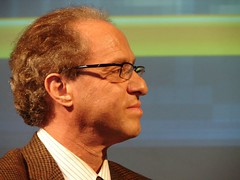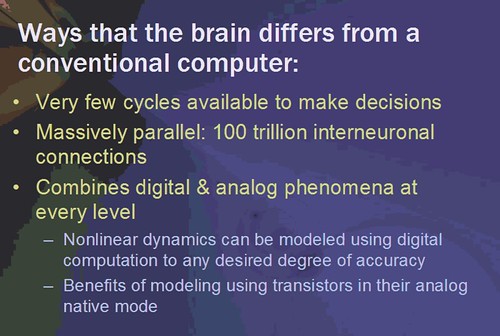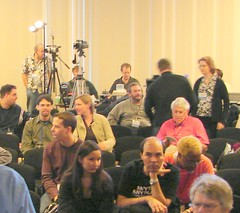DAY TWO
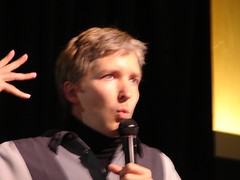 Mark FinnernSAP Developer Network
Mark FinnernSAP Developer NetworkSAP Developer Network …points for recognition. Hiring pool. SAP overall: 12 million users. 88,700 installs. 1500 partners. 28,900 employees. Focus now more on product life cycle and business process change as well as business process change. (Cf. Shai Agassiz talk at Accelerating Change 2004).
Walter J. Freeman, on the Poetry of Brains at the August Future Salon, said we focus too much on the individual brain instead of on the collaboration of groups of brains.
Still working to fulfil Doug Engelbart’s vision: As much as possible, to boost mankind’s collective capability for copying with complex, urgent problems.
Theme: Large-Scale Collective IQ: Facilitating its Evolution
A World that would work for all of us. Martin Luther. Even if the world would end tomorrow…
Richard Branson’s mother asked her young son, “Do you know the way home?” He thought so. He let him out to make his own way home. Ah-ha. On the way home, he realized he was responsible for his life.


In the break area, I hailed a fellow passing by to ask him, “How does your purple hair play at Microsoft?” He told me he had been working on the team for a product named Indigo. Now Indigo has become Windows Communications something-or-other. He’s only been on board six months, so because his on-boarding is still fresh in his mind, I asked him about becoming acclimated to Microsoft. He described an avalanche of information and meetings. Too much email. Everyone at Microsoft complains about getting too much email – it’s the downside of being transparent.
Note to self: check WFF: Workflow Foundation, a new element release last week in beta.
Tom MaloneFuture of Work
Today’s topic is intelligence amplification. Tom will talk about amplification by organizing the intelligence of many humans.
The Technology Stack
Organizations ?
Application software
System software
Hardware
Wikipedia. Stated 2001. Already over 730,000 articles.
We are in the early stages of an increasing in human freedom in business…that may be as important as the change to democracies has been for governments.
Now possible to have the economic benefits of large organizations without giving up the human benefits of small ones (freedom, creativity, etc).
Lower communication cosgts mean many people have enough information to make more decisions for themselves. What will dirve these changes is what people really want.
eBay. 430,000 people make their living from selling on eBay. If they were employees, eBay would be the second largest company in the nation.
Bands (Decentralized, unconnected) ? Kingdoms (Centralized) ? Democracies (Decentralized, connected)
Business 1900, 1950, 2000. Small, local businesses ? Large, centralized corporations ?Empowerment, outsourcing, networked organization
People making their own decisions are more motivated and have more fun.
Central-----------------------------------Decentral
Loose hierarchies Democracies Markets
Linux, AES, R&D, Movies, buildings
Consulting VISA, Mondrago
Cinematrix for group flying sim
Cheap communication is making feasible whose new regions of the design space for organizations. To take advantage of these new possibilities, we have to invent them.
You probably have more choices than you realize. To make the choices wisely, you need to think about what really matters to you.
Answers can only go from our own inner world.
Small is beautiful
“What can I actually do? The answer is as simple as it is disconcerting: we can, each of us, work to put our own inner house in order. The guidance we need for this work cannot be found in science or technology…but it can still be found in the traditional wisdom of mankind.” Small is Beautiful, 1973.
Dileep GeorgeNumentawww.numenta.comUnderstanding and Modeling the Neo-cortex…to accelerate our understanding of intelligence
1 mm thick cortex. All memory, six layers of neurons.
Common cortical algorithm. The neo-cortex is everywhere functionally uniform than hitherto supposed to and its avalanching enlargement in mammals and particularly in primates has been accomplished by replication of a basic neural module.”
“There is nothing intrinsically motor about the motor cortex….
Neo-cortex atop this
Reptilian brain. Senses in, behavior out.
Drifts into Hawkins’ Intelligence theory
SPECT and the Future of Mental HealthDaniel Amen, MDChange Your Brain; Change Your LifeMaking a Good Brain GreatThree years in marital therapy
• Furniture factory worker
• “He’s an asshole”
• Being fumed to death
Standard of care
Brain imaging in clinical practice is the next major advance in psychiatry
Your brain has to do with everything you do
Who you are as a spouse, friend, parent, manager
When your brain works right, you work right
When your brain doesn’t work right, you have trouble
Descartes was wrong
Society figures free will is zero or 100%
Give us a couple of drinks and it’s 50%
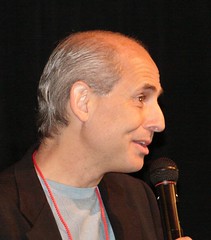
Healthy, happy, effective, consistent, successful
Unhealthy, sad, troubled, inconsistent, unsuccessful
Your brain is really complicated
100 billion neurons, trillion supporting cells
2% of body’s weight, uses 20-39% of kcals
More connections than stars in universe
A piece of brain tissue size the of grand of sand contains 100000 neurons
Brain is very soft
Consistency of soft butter, tofu, custard or between an egg white and jello
Skull is really hard. Many sharp ridges
Brain injuries matter
Kids should not play football
Care more about our faces, boobs, bellies, butts than our brains
Most problems are not simple disorders. 13% family doctors oversimplify. ADD or depression is not single or simple disorders.
Imaging is important in clinical psychiatry
It’s as if an orthopaedist took a history, then recommended surgery…
Or a mechanic who talked about your car’s problems, then told you needed a new carburettor without raising the hood
You can change your brain. Right interventions help; wrong interventions hurt.
Myth of the perfect brain. We all need a little help.
Brain is not completely developed until age 25. We need to take care of young brains. Early brain injuries, drug abuse, many colleges, malnutrition are disasters for brain development.
SPECT = single photon emission computed tomography.
Opens the mind to other treatments—medical, nutritional, supplemental, and psychotherapeutic elements.
Brain envy.
You can tell nine years before Alzheimer’s becomes apparent
Why are shrinks the only medical specialists the only doctors who don’t look at what they’re treating?

How to Optimize the Brain. Protect. Feed. Nourish. Work. Exercise. Coordinate. Thinking skills. Making love. Supplements. Early treatment.
When I remember all the crap I learn in high school, it’s a wonder that I can think at all.
We can change our brains and our lives. You have a choice: which brain do you want?
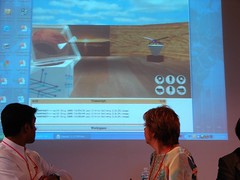 PanelRuzena BajcszyCenter for IT Research in the Interest of Society, UC Berkeley
PanelRuzena BajcszyCenter for IT Research in the Interest of Society, UC BerkeleyCitris
Alan Kaye, Croquet, (1) Take images & video to create your own gallery. (2) Have built a library with 42 cams that can digitize whatever you are doing. See
video.
Group interactions in Tele-immersion: meeting in the virtual space.
 Shun-Jie
Shun-JieJournal of Futures Studies, Tamkang University, Taiwan
Only university with required course in future studies. First private university in Taiwan.
How to be a country….
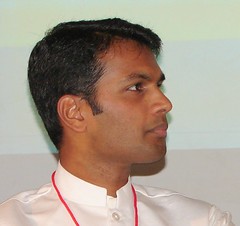 Sr. Denise Lawrence
Sr. Denise LawrenceBrahma Kumana World Spiritual Organization
The Role of Meditation in Intelligent Learning
What meditation has done for me.
Non-religious, no guru, practical, run by women, allied with United Nations.
Able to have better control of myself. When I change, the world changes.
Conventional learning. Based on conventional scientific methods, relies upon externally acquired data. Input limited to the five senses. Disregards the world of consciousness: intuition, association, memory, inspiration, subjective analysis, etc. Influenced by prevailing ideas.
Intelligent learning. Based on CS, cog sci, AI, educational learning theories, and multi-agent approaches. Ideally incorporates social and emotional intelligence. Promotes learning with understanding and transfer.
How does medication add to this mix: Meditation alters the quality and process of thought. Thought processes become influenced by inner stillness, intuitive clarity, creative insight, and innate moral wisdom. This is reflection, looking at how I think. Meditation gets you in touch with yourself. Understanding acquires depth and is viewed in context. Intelligent learning comes out of the box and into consciousness. Meditation is experienced: it’s more than information.
How does this happen? Deep silence. Becoming a listener. Taps your well-spring of original thought. Your thinking becomes focused, disciplined, coherent and contiguous. Enhances and brings healthy balance to your personal and professional life, if practiced regularly.
Incorporate into intelligent learning environments. Still inner environment. Reflective breaks.
Responding to a question: The self was the most neglected aspect of his life before meditation. Is he selfish? Yes. Should he be? Yes.
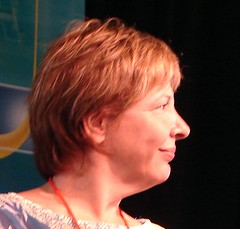 Robin RaskinDigital Mom
Robin RaskinDigital MomResponsible Computing
Rearing Digital Kids
De-celerating change 2005.
Things done maliciously. Unethically. Theft.
Recent emails
Parents of suicidal children
Teachers of kids who’ve violated online space of others
We can’t accelerate tech change without social change
Cyberworld is the last outpost of freedom in overscheduled lives.
Risk beyond XXX
Social networks: Counting friends exponentially, social activities migrate to workplace, reputation-building: differentiating low-value, low-trust relationships. Online bar scene equivalent. Dangers of interpretation. Spin the bottle. Rate your teacher.
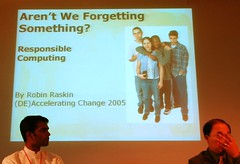
Notions of privacy: Schools are clueless about the net. 40%
Handheld everything
Theft: music 10:1, plagiarism, truth (?)
Effect on workplace behavior
Intelligent, informed choice of best communications medium.
Non-private, malleable discussion.
Audit trail that goes un-audited
One word, out of context decision-making from crackberries
Jayson Blair…
Global Crossing, Tyco, WorldCom, etc
Email the culprit
Solutions
Systems that build good behavior
Money for education programs. Industry tithes,
Graduated internet driver’s license
Dichotomy of Design & EvolutionSteve JurvetsonDraper Fisher Jurvetson4999 early drawings
299 dedicated design work
19 brought to market
1 works
Hotmail, ICQ – what is so special with these network companies zooming up into growth. Skype. Kazaa. Zero to ten million users in 14 months.
Ecosystems of innovative dreams, networked memes, libraries of genes
Vetter does genome of 1 millimeter of sea water, seeking the DNA of an ecosystem
Biological Muse to computer science
Algorithms: evolving complex systems, nanotech futures, AI and IA
Libraries: interface questions
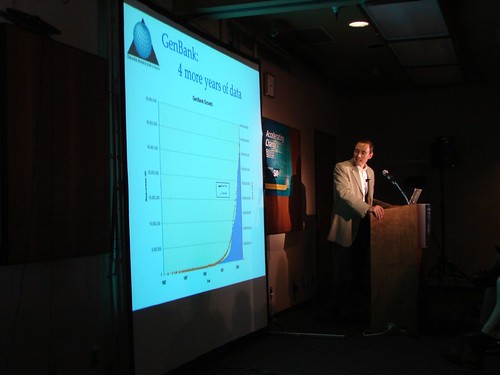
Technology Exponentials
Evolution, computation, storage, bandwidth, internet, genes mapped, MRI scan resolution. “Technology is the evolution of evolution itself.” Kevin Kelly
Open Evolutions
Genes, Memes, Blogs, Ecosystems, Volume
Evolved systems
Emergent layers of abstraction
Subsystem inscrutability: bubble sort, neural networks, wisdom of crowds
Computational Equivalence – no simple shortcuts
Dichotomy
Design Evolution
Control
Brittle Out of control
Robust, resilience
Simple problems Complex
Subsystems clarity
Portability
Modular reuse Inscrutable subsystems
Hierarchical subsumption
Path dependence (sensory I/O, AI, algorithm survival)
Co-evolutionary
Implications
Bifurcation of approach? Blending? Sequencing? Theory? Quantum Computational Equivalence
Portability
Co-evolutionary islands
Path dependence; algorithm, senses
Alien I
AI vs IA
Jurvetson.blogspot.com
 Blake RossFirefox
Blake RossFirefoxPeople want a simple, easy-to-use browser. How do you progress? Openly.
Microsoft sees value in the Internet
Tamgotchies -------------
Tickle Me Elmo-------------
Internet---------------------------------------------------------------
AOL killed Netscape. Put a Shop button on the toolbar. Optimize for one site.
Feel the pain.Jane says: #(&$#^!
Marketing says: Can we synergize voiceover XML based RSS podcasts?
Developer says: Marketing’s drunk again
Usability Lab says: User 12b experienced mild discomfort with…
2001 Microsoft disbanded the IE team.
Fixing open source
• Open source developers have egos the size of Manhattan
• The first thing we did was rip off the competition
• Open source is about more than developers. Projects are wasting talent!
SpreadFirefox!
Second LifePhilip Rosedale, Linden Lab Video.
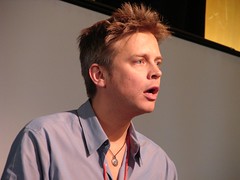 Panel: the ASF Core TeamJohn Smart, PresidentJerry Paffendorf, Community directorIveta Brigis, ASF BoardJim Turner, Executive Director
Panel: the ASF Core TeamJohn Smart, PresidentJerry Paffendorf, Community directorIveta Brigis, ASF BoardJim Turner, Executive Director
Jim Turner

Jerry Pallendorf
Incorporated 2002
Acceleration Studies Foundation
Panel: What next?Alex LightmanKids learn more from adults than from other children. Being in business is almost a spiritual pursuit. What is the one thing all this is representative? They are all learning curves. In terms of this weekend, what value did you bring? Tell people about it. Start your own Future Salon.
Steve JurvetsonLot of ideas that don’t yet have a theory. Think biology & the messiness of it all.
Cecily SummersPush Institute. Accelerating change, accelerating chaos. Forgot to bring cell phone charger. Realize how tech is reorganizing us as people. Track human nature as well as tech.
 Joi Ito
Joi ItoVenture capitalist. On the board of every group you’ve ever heard of. Open Source, Mozilla, Creative Commons, etc. Monopolists at work: Hollywood, phone companies that want to make the net into a cable t.v. network. Brazil Russia India China (BRIC): they don’t give a shit. The world is a lot more international than it was. Linux, IRC.
 Beth Noveck
Beth NoveckIntellectual property form. Lot of discussion about the brain, individual and collective. Group > individual. Institutions fear the mob. Interface to help us see ourselves and the tech. Have to direct tech and groups in support of social justice. How to pull all the smart minds together.
 George Gilder
George GilderAll the exponential curves are experience curves. The Education of Henry Adams started it all with the acceleration curve of human progress. Learning has to do with information. The laws of chemistry and physics not information-rich to the extent of biology. Proteome follows genome. Learning in the future will occur in processes of synthesis and integration. Life is information: that’s what differentiates life from other forms. The reason all information is migrating to the electro-magnetic spectrum is because the spectrum is low-entropy.
 Rudy Rucker
Rudy RuckerOne of the few Wolframites aside from Stephen Wolfram. The Lifebox, The Seashell, and The Soul. As Bucky said, I seem to be a verb. Assuming we advance in hardware as predicted, where are we going to get the software? The new hardware comes with a blank hard drive. Will is unpredictable, therefore free. Hive Mind. The dream of the universal library. | The world is a computation…
Accelerando.org? Singularity science fiction.
Jay: I’m math-challenged, and value gut feel over calculation. Joel Garreau wrote Radical Evolution. Ray Kurzweil is the rosy optimist, Bill Joy the doomsayer, and Jaron Lanier between the two. What do you guys think?
Alex: Rivers of Time, Brin. All three are true. Sudan to become a Chinese pumping station. America will be in the middle
John Smart: Avatars. Peace, justice, all the time we want.
Steve: Near-term: g-fear. 50-50 odds > Club of Rome disaster. More wealth in fewer hands.
Beth: It depends. On our willingness to take control of the situation. What are the structures that will get us there? Tom Malone: what do we mean by democracy? How do we structure the architecture? How can we make humanities and tech converge? Law has focused on the dark side; and we become the tools of our tools?
George: Capitalism overcomes inequality and poverty. We’ve just enriched a billion Asians.
Finale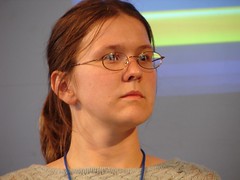
Iveta Brigis
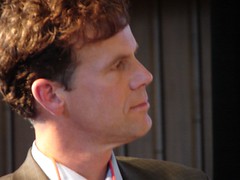
John Smart
The Thinker, Futurist version
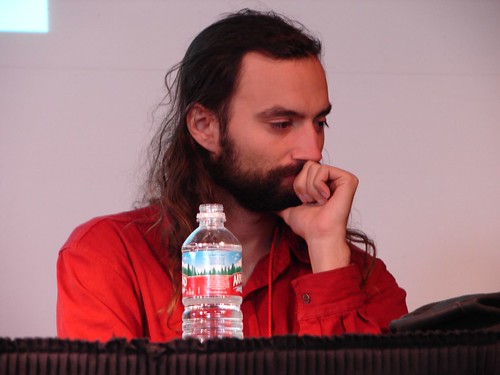
Sibley Verbeck, StreamSage
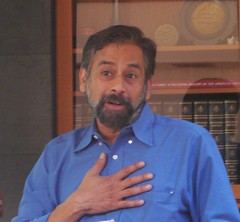 A group of us spent the better part of today learning about HeartMath from Joseph Sundram (left, showing where his heart is) and Regan Caruthers (below right).
A group of us spent the better part of today learning about HeartMath from Joseph Sundram (left, showing where his heart is) and Regan Caruthers (below right).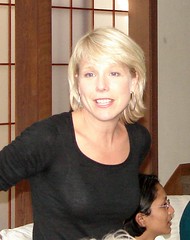 The simple techniques we learned can put stress back in its cage. I could feel positive change during the workshop and plan to practice the technique for a while.
The simple techniques we learned can put stress back in its cage. I could feel positive change during the workshop and plan to practice the technique for a while.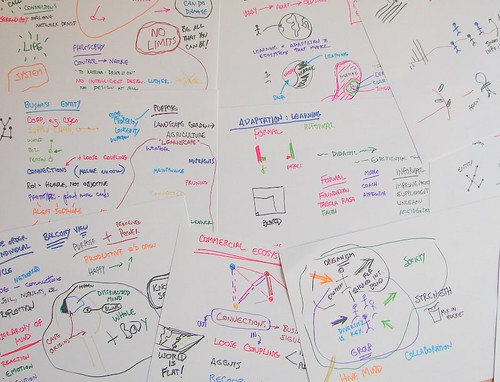





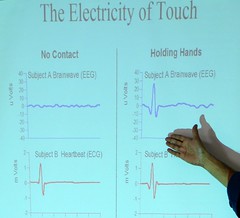



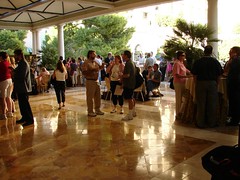



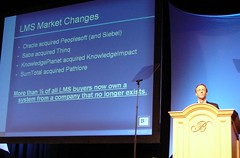
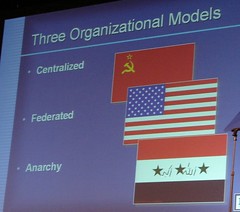



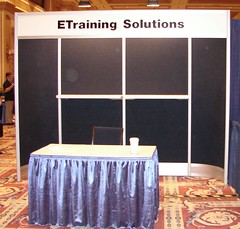
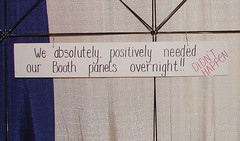
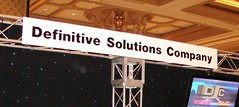
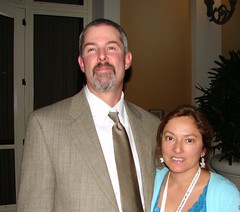
 Simple as peanut butter
Simple as peanut butter


